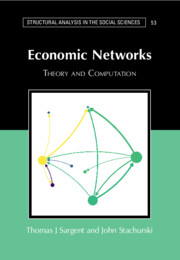Refine search
Actions for selected content:
6 results
A NOTE ON IMPLICIT ITERATION PROCESSES
- Part of
-
- Journal:
- Bulletin of the Australian Mathematical Society , First View
- Published online by Cambridge University Press:
- 16 May 2025, pp. 1-12
-
- Article
-
- You have access
- Open access
- HTML
- Export citation

Economic Networks
- Theory and Computation
-
- Published online:
- 11 April 2024
- Print publication:
- 25 April 2024
The Contraction Principle for Multivalued Mappings on a Modular Metric Space with a Graph
-
- Journal:
- Canadian Mathematical Bulletin / Volume 59 / Issue 1 / 01 March 2016
- Published online by Cambridge University Press:
- 20 November 2018, pp. 3-12
- Print publication:
- 01 March 2016
-
- Article
-
- You have access
- Export citation
Complementarities and the existence of strong Berge equilibrium
-
- Journal:
- RAIRO - Operations Research / Volume 48 / Issue 3 / July 2014
- Published online by Cambridge University Press:
- 30 April 2014, pp. 373-379
- Print publication:
- July 2014
-
- Article
- Export citation
FIXED POINT THEORY FOR VARIOUS CLASSES OF INWARD MULTIVALUED MAPS
- Part of
-
- Journal:
- Bulletin of the Australian Mathematical Society / Volume 81 / Issue 1 / February 2010
- Published online by Cambridge University Press:
- 21 October 2009, pp. 1-15
- Print publication:
- February 2010
-
- Article
-
- You have access
- Export citation
Conditions for the Uniqueness of the Fixed Point in Kakutani's Theorem
-
- Journal:
- Canadian Mathematical Bulletin / Volume 24 / Issue 3 / 01 September 1981
- Published online by Cambridge University Press:
- 20 November 2018, pp. 351-357
- Print publication:
- 01 September 1981
-
- Article
-
- You have access
- Export citation






